MVR Evaporation System for Zero Discharge in Coal Chemical and Petrochemical Wastewater Treatment
The MVR (Mechanical Vapor Recompression) evaporation system is a cutting-edge solution for achieving zero discharge in the deep treatment of coal chemical and petrochemical wastewater. This system efficiently recycles and purifies wastewater using advanced evaporation and condensation technology, reducing environmental impact and meeting stringent discharge standards. Its energy-efficient design, powered by vapor recompression, minimizes operational costs while ensuring high reliability and long-term performance. This innovative approach sets a new benchmark for sustainable wastewater management in the coal chemical and petrochemical industries.
WTEYA Group specializes in delivering comprehensive evaporation and concentration system equipment solutions. With a strong commitment to research and development, innovative design, precision manufacturing, seamless installation, and expert commissioning, the company has established itself as a leader in evaporation technology products.

At the heart of WTEYA Group's offerings is the evaporation system, which is critical for achieving zero discharge of industrial wastewater and maximizing waste resource utilization. The company focuses on a wide range of industries, including electroplating and metal surface treatment, lithium battery manufacturing, aluminum ash wet treatment, coal mining, coal chemical processes, and oil fracturing flow-back fluid management.
WTEYA Group provides end-to-end zero-emission solutions tailored to industrial wastewater treatment, offering services such as evaporation system leasing and operational support. These services significantly reduce customer investment and operating costs while ensuring sustainable and efficient wastewater management.
Sources and Characteristics of High-Salt Wastewater in the Coal Chemical Industry
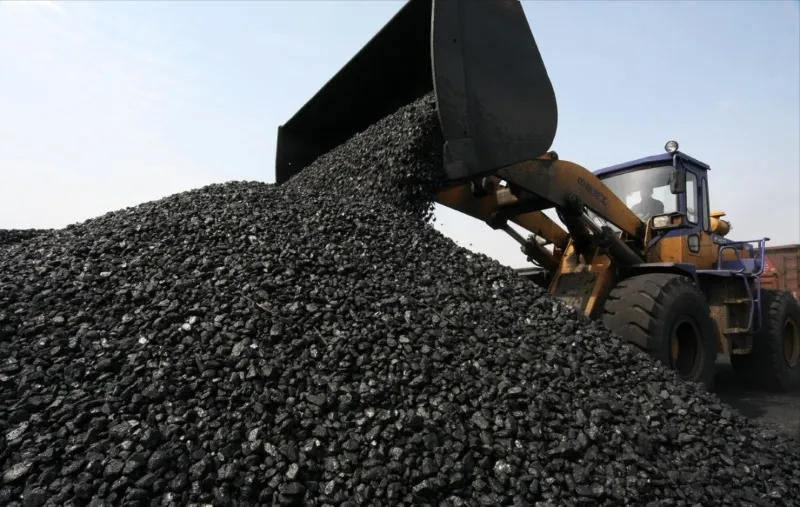
High-salt wastewater in the coal chemical industry refers to wastewater with a salt content exceeding 1% that is generated during various production processes. Key sources include boiler drainage, freshwater replenishment, and desalted water treatment. This wastewater typically contains inorganic salts such as sodium nitrate and sodium chloride, alongside organic compounds like cyanides and aromatic hydrocarbons. Notably, freshwater replenishment processes contribute the highest salt content, accounting for approximately 50% of the total high-salt wastewater generated.
Characteristics of High-Salt Wastewater:
· Complex Composition
High-salt wastewater contains a mix of cations (e.g., potassium, sodium, magnesium, calcium), anions (e.g., chlorides, sulfates), and impurity ions. The specific composition can vary significantly depending on the industrial process.
· Significant Harm
With salt concentrations typically around 10,000 mg/L and sometimes reaching up to 30,000 mg/L, high-salt wastewater is challenging to biodegrade. Excessive salt levels can dehydrate microbial cells, causing plasmolysis, and increasing solution concentration, hampering biological treatment efficiency.
· Resource Potential
When treated through pre-treatment, crystallization, and other processes, high-salt wastewater can yield valuable salts and recoverable water resources. Proper management turns this industrial waste into a resource, offering both economic and environmental benefits.
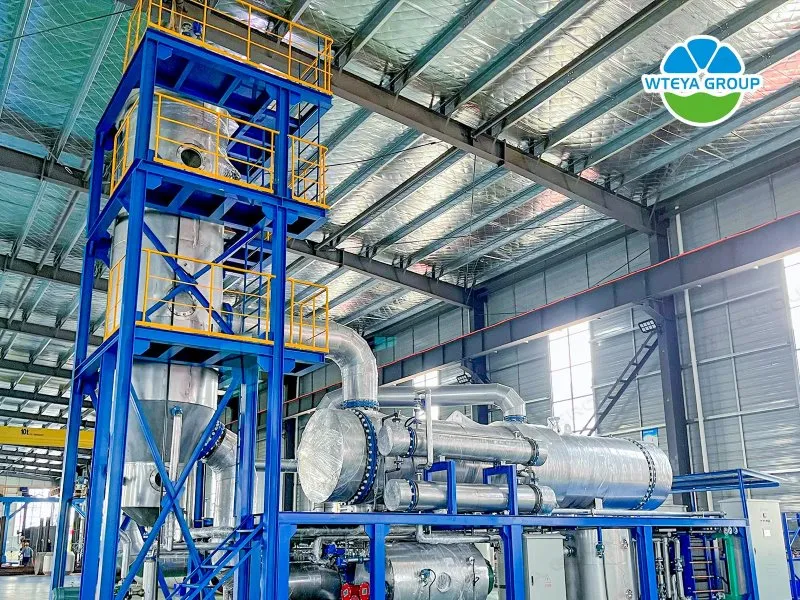
MVR Evaporation and Crystallization System for High-Salt Wastewater Treatment
High-salt wastewater in the coal chemical industry can be effectively treated using MVR (Mechanical Vapor Recompression) evaporation and crystallization systems. These systems utilize preheating, evaporation, crystallization, and separation processes to achieve optimal results.
Process Overview:
· Preheating
The feed solution is heated to 88–100°C to reduce the solubility of non-condensable gases like oxygen and carbon dioxide. This minimizes carbonate scaling and reduces evaporator corrosion and scaling.
· MVR Evaporation
After preheating, the solution enters the MVR evaporator, where a liquid film distributor ensures uniform heat transfer and efficient evaporation. The resulting steam and concentrated brine are collected in the brine tank, allowing sufficient time for the formation of fine crystals.
· Crystallization
Concentrated brine is directed to a crystallizer, where it undergoes flash evaporation after being heated to the boiling point. To manage scaling and maintain optimal TDS levels, some brine is recycled back to the evaporator, while a portion is sent for solid-liquid separation.
· Solid-Liquid Separation
The crystallized slurry is processed in a centrifugal dehydration system to separate solids from liquids. The recovered brine is further concentrated, and the solids are managed appropriately.
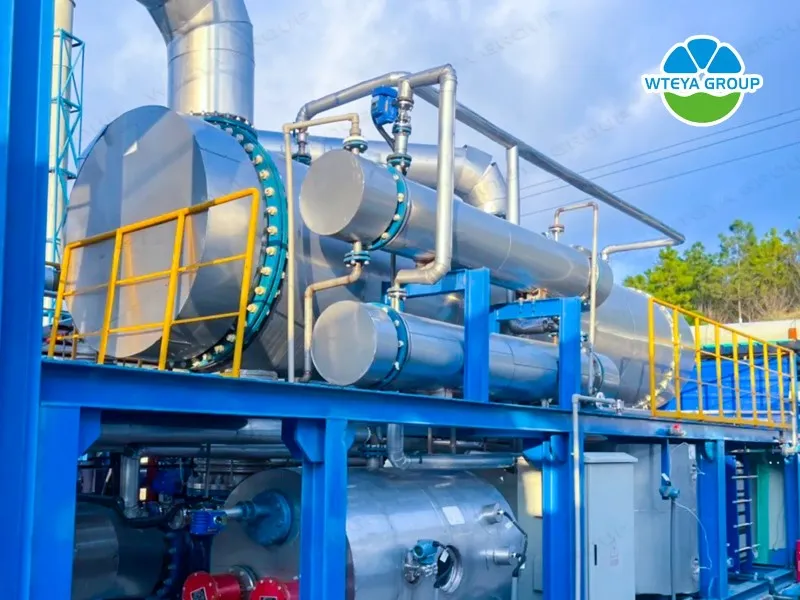
Advantages of the MVR System
· Energy Efficiency
MVR technology compresses evaporated steam for reuse as a heat source, significantly reducing energy consumption compared to traditional methods.
· Scalability and Reliability
The system's forced circulation and preheating mechanisms address scaling and corrosion challenges, ensuring consistent and reliable operation.
· Environmental Benefits
By achieving zero discharge, the system minimizes pollution and recovers valuable salts and water resources, aligning with sustainability goals.
· Versatility
The MVR evaporation and crystallization system is adaptable to most salt-containing wastewater, making it suitable for various industries.

Summary of Process Flow:
· Feed solution is preheated through heat exchange with condensed water.
· Heated solution enters the falling film evaporator for initial concentration.
· Concentrated brine is transferred to a crystallizer for flash evaporation.
· Crystallized slurry undergoes centrifugal dehydration for solid-liquid separation.
By integrating advanced evaporation and crystallization technology, the MVR system offers a comprehensive and energy-efficient solution for high-salt wastewater treatment in the coal chemical industry.
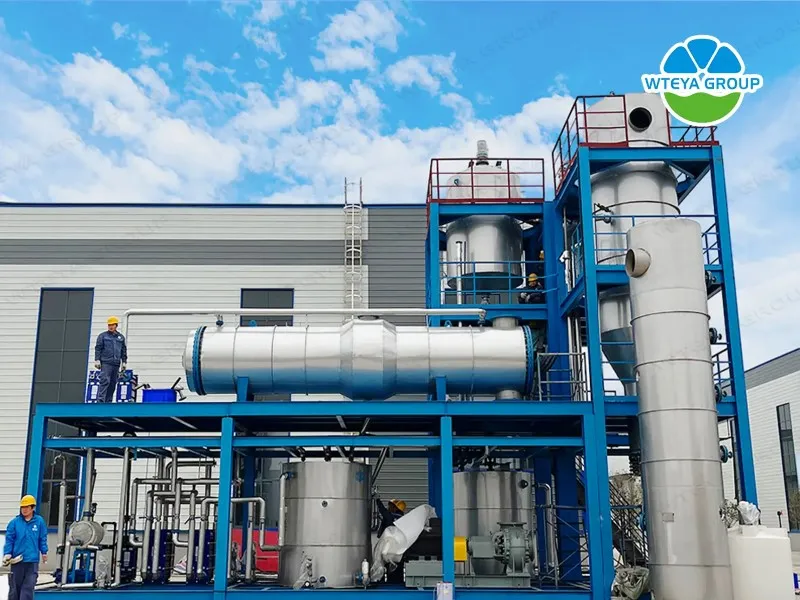
Where to Buy an MVR Evaporation System
If you're seeking an efficient MVR evaporation system for treating petrochemical wastewater or high-salt wastewater from the coal chemical industry, WTEYA Group is your trusted partner. With over 15 years of expertise, WTEYA Group is a leading manufacturer in the water treatment industry, offering advanced evaporation and crystallization technology solutions to deliver high-quality freshwater effectively and efficiently.
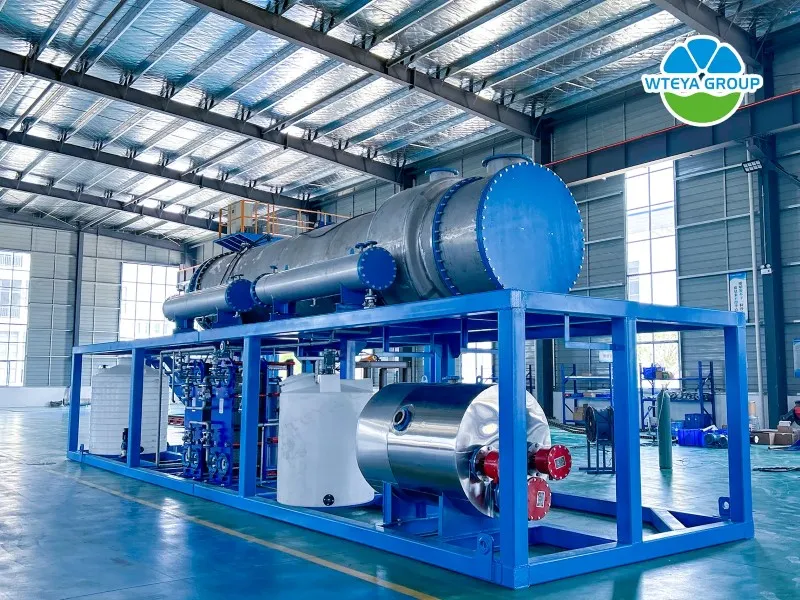
Why Choose WTEYA Group?
· Tailored Solutions: Every enterprise has unique needs. WTEYA Group specializes in providing customized water treatment solutions that consider wastewater type, treatment scale, and specific operational requirements.
· Proven Expertise: With rich industry experience, WTEYA Group ensures reliable and effective system design and implementation.
· Cutting-Edge Technology: Our MVR systems are designed for superior performance, helping you achieve zero discharge and meet environmental regulations.
Let WTEYA Group design an MVR evaporation system that is perfectly suited to your requirements. Contact us today for a detailed quotation:
· Email: info@wteya.com
· WhatsApp: +86-1800 2840 855
Get the right solution to turn your wastewater challenges into sustainable outcomes!







